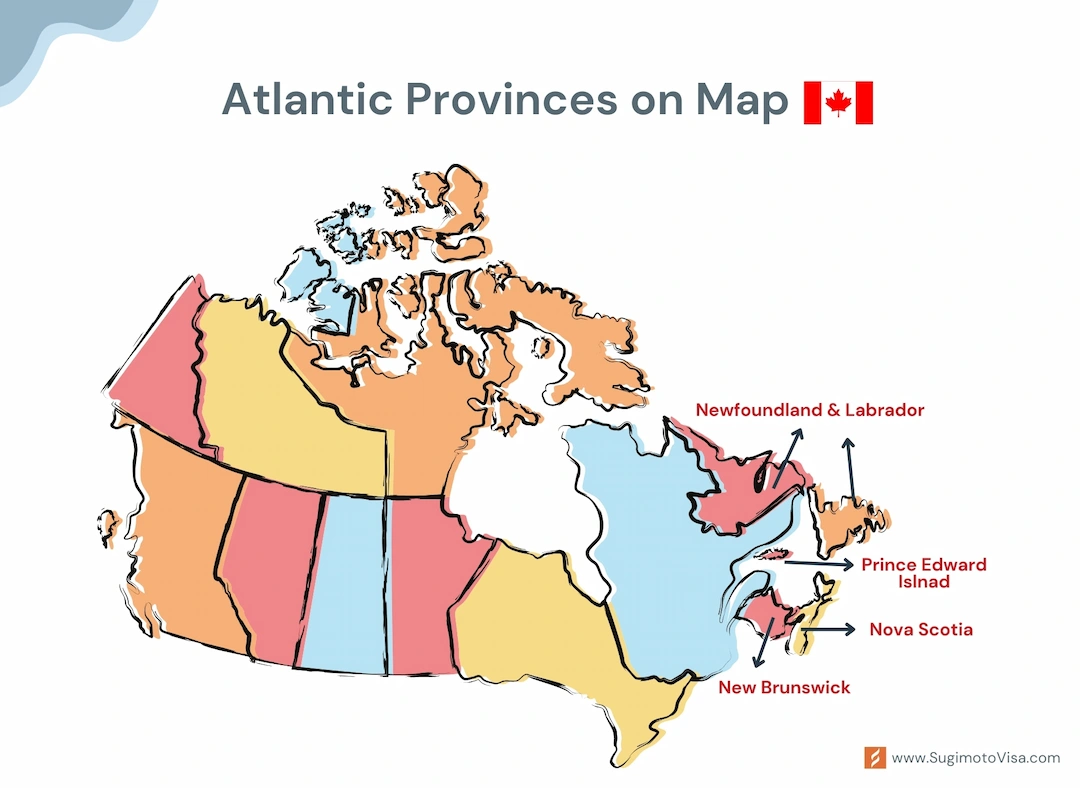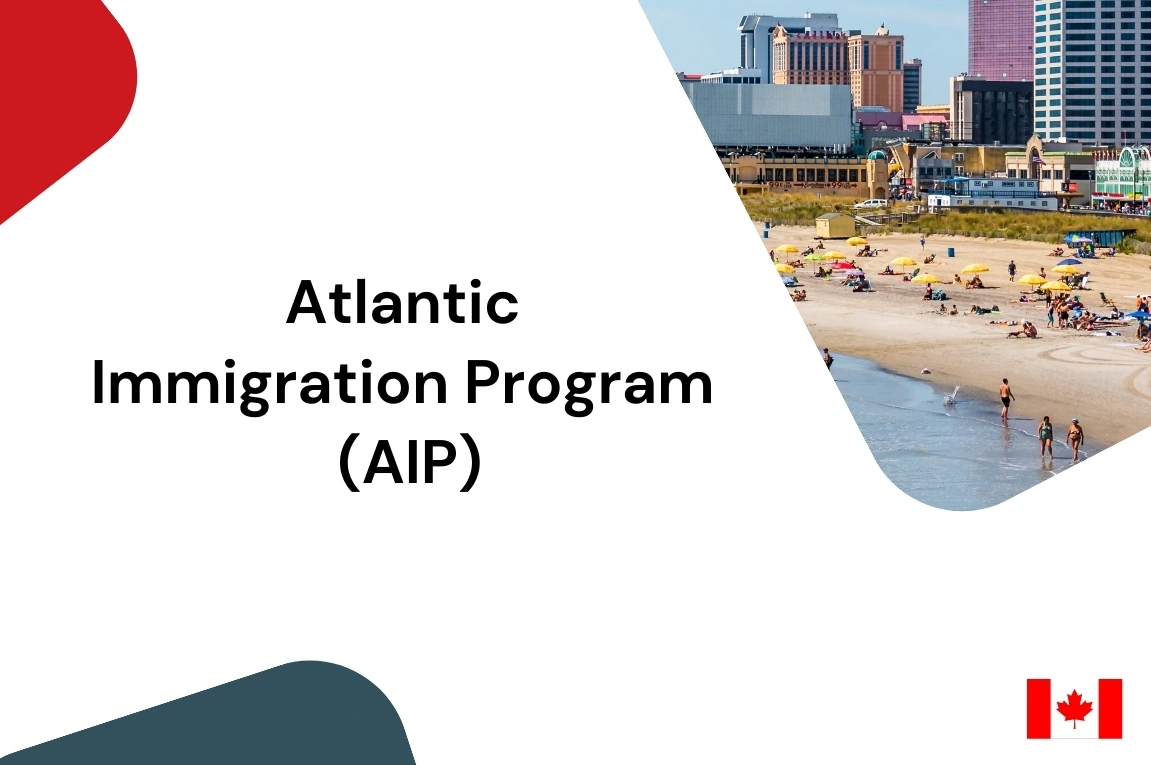The Atlantic Immigration Program (AIP) is a fast-track pathway for skilled workers and graduates to immigrate to the four Atlantic provinces (Nova Scotia, New Brunswick, Prince Edward Island, and Newfoundland & Labrador) and gain permanent residency in Atlantic Canada.
Atlantic Canada is quickly becoming a favorite for newcomers. Why? Friendly communities, a slower pace of life, and stunning nature make it feel more relaxed and often more affordable than big cities like Toronto or Vancouver.
If you’re looking for a smooth path to permanent residency in Canada, the Atlantic Immigration Program (AIP) could be your ticket. It’s designed to help skilled workers and international graduates move to these provinces, while providing guidance to settle comfortably into their new communities.
Quick Review
Purpose
- Designed to address labour shortages in Atlantic Canada.
- Helps employers fill jobs they can’t find local workers for.
- Encourages newcomers to stay in the region long-term by offering settlement support.
Categories
The program is not divided into streams like it used to be (under the old Atlantic Immigration Pilot Program). Instead, the permanent AIP is one program with eligibility depending on:
- Job offer skill level
- Work experience
- Education
Key Features
- Employer-driven: You need a job offer from a designated employer in one of the four provinces.
- Settlement support: Before applying for permanent residence, you must work with a settlement service provider to create a settlement plan for you and your family.
- Faster processing: Applications are generally processed more quickly than some other immigration programs.
Don’t wait to explore your future! Get your personalized plan by filling out our assessment form.
What is the Atlantic Immigration Program (AIP)?
In simple terms, AIP connects skilled workers and graduates with employers in Atlantic Canada. Its main goals are:
- Fill labour shortages in the region
- Attract newcomers to live and work in smaller provinces
- Help people and families settle successfully in their new communities
The program covers four provinces:
- Nova Scotia
- New Brunswick
- Prince Edward Island (PEI)
- Newfoundland & Labrador
✅ Unlike some other immigration pathways, AIP requires a job offer from a designated employer. That means it’s employer-driven and comes with strong support to help you integrate into local life.
Key Features of AIP
AIP is designed to make immigration easier, faster, and family-friendly:
- Employer-driven program: You need a job offer from a designated employer in Atlantic Canada.
- No LMIA required: Employers don’t need a Labour Market Impact Assessment, which speeds up the process.
- Faster PR processing: Applications usually move quicker than many other programs.
- Mandatory settlement plan: You’ll get guidance on housing, schools, and community integration.
- Family-friendly: Spouses and children can come along, with work and study permits available.
It’s a practical and supportive way to start a new life in Canada, especially if you want guidance along the way.
Latest News & Updates on the AIP
🚨 August 2025: In-Demand Jobs for Permanent Residency (PR) in Atlantic Canada
In 2025, the Atlantic Immigration Program (AIP) has become more targeted. The Atlantic provinces are only hiring for certain in-demand jobs due to limited immigration capacity.
In-demand jobs by province:
- Prince Edward Island (PEI): Healthcare, construction, manufacturing
- Nova Scotia: Healthcare and social assistance, construction
- Newfoundland & Labrador: Healthcare, Information Technology (IT), agriculture
- New Brunswick: The program is paused for the rest of 2025
Key Points for AIP in 2025:
- Only certain occupations are open this year
- Jobs in healthcare, construction, IT, and agriculture have higher chances
- New Brunswick will not accept new AIP applications in 2025
🚨 April 17, 2025: New Brunswick’s AIP Program Closed for 2025
New Brunswick announced: “The Atlantic Immigration Program will not accept new applications for the rest of 2025, as the province’s intake capacity has been reached. The 2025 quota for New Brunswick was 1,250 applicants and has now been filled. Only applications submitted by April 4, 2025, will be considered.”

Atlantic Immigration Program in Canada by Province
1. Prince Edward Island (PEI)
PEI was the first province to announce that, due to high demand and limited quota, it will only accept applications from candidates working in these sectors:
- Healthcare
- Construction
- Manufacturing
Applicants in other fields can only submit an Expression of Interest (EOI) through the provincial PNP at this time.
2. Nova Scotia
Nova Scotia announced that in 2025, priority will be given to candidates already working in the province whose work permits expire within the same year.
Among these candidates, priority is higher for those in:
- Healthcare and social services
- Construction
For applicants outside Canada, applications in these sectors will be processed faster.
Additionally, exceptions are made for employers hiring in these areas:
- Trucking
- Science and technology
- Clean energy
- Natural resource development
3. Newfoundland & Labrador
Newfoundland & Labrador has not paused the AIP, but it has released a list of priority occupations that are exempt from labour market testing and are processed faster.
Priority healthcare occupations include:
- Physician (various specialties)
- Nurse
- Clinical psychologist
- Physiotherapist
- Radiation therapist
- Dosimetrist, and more
Information and Technology (ICT) sector:
- Software programmer/developer
- Electrical/Mechanical/Biomedical engineer
- AI developer
- Infrastructure engineer
- Security, cloud, and network specialist
- Data analyst, bioinformatics specialist, etc.
Aquaculture sector:
- Farm manager
- Equipment technician, and more
From February 2025, this province will also use the EOI model for AIP, meaning candidates must first submit an EOI. After receiving an invitation, they can apply for endorsement.
4. New Brunswick
New Brunswick announced that from April 4, 2025, until the end of the year, it will not accept new AIP applications due to quota completion.
- Only applications submitted before April 4 will be considered, as long as they are for jobs outside the closed list.
However, in June 2025, the province received 1,500 additional PNP quotas, and candidates can check their eligibility in NB PNP streams.
Eligibility Criteria
To apply for AIP, you need to meet some basic requirements:
Job Offer:
- Must be full-time and from a designated employer in one of the four Atlantic provinces.
- Minimum duration: one year
Work Experience:
- Skilled roles (NOC 0, A, B, or C)
- Some exceptions for recent graduates from Atlantic institutions
Language Requirements:
- Basic English or French skills
- Accepted tests: IELTS, CELPIP (English), TEF, TCF (French)
Education Requirements:
- Foreign credentials must be assessed (ECA)
- Canadian degrees are automatically accepted
Proof of Funds:
- Must show you can support yourself and family
- Exceptions if already working in Canada under AIP
International Graduates:
- Flexible rules for recent graduates from recognized Atlantic institutions
- Lower work experience requirements and sometimes easier job offers
Step-by-Step Process of AIP
Here’s how AIP works from start to finish:
- Get a Job Offer from a Designated Employer
- Check official provincial lists for designated employers
- Make sure your offer is full-time and meets program requirements
- Create a Settlement Plan and Get Provincial Endorsement
- Work with a settlement service provider to plan housing, schools, and community integration
- Province reviews your plan and endorses your job offer, which is required for PR
- Apply for a Temporary Work Permit (Optional)
- Start working in Atlantic Canada while your PR is processed
- Gain Canadian work experience and settle early
- Apply for Permanent Residence
- Submit application to IRCC with required documents: job offer + endorsement, language results, education credentials, proof of funds, settlement plan
- Processing is usually faster than many other programs
- Receive PR and Settle in Atlantic Canada
- Once approved, you and your family become permanent residents
- Start your new life in a welcoming, smaller province
AIP vs Other Programs
AIP vs Provincial Nominee Programs (PNPs)
| Feature | AIP | PNPs |
|---|---|---|
| Region | Atlantic Canada only | Most provinces & territories |
| Job Offer | Required | Some streams require it, others don’t |
| Settlement Support | Mandatory | Optional |
| Processing Speed | Usually faster | Varies |
| PR Path | Direct PR application | Often two steps (nomination → PR) |
| Candidate Flexibility | Best with job offer | More flexible without a job offer |
AIP vs Express Entry
| Feature | AIP | Express Entry |
|---|---|---|
| Points System | No | Yes, CRS score |
| Job Offer | Mandatory | Optional |
| Settlement Plan | Required | Not required |
| Processing | Fast, employer-driven | Fast but competitive |
Advantages of AIP
- No LMIA required: Less paperwork for employers
- Faster PR processing: Applications move quickly
- Direct path to PR: Straightforward route
- Settlement support: Personalized help for housing, schools, and integration
- Family-friendly: Spouses and children included
- Employer-driven: Job offer increases approval chances
Disadvantages:
- Limited to Atlantic Canada
- Job offer is mandatory
- Tied to employer initially
- Smaller provinces, smaller job markets
✅ List of Designated Employers (and How to Find Them)
Designated employers are companies approved by the Atlantic provinces to hire under the AIP. These employers can sponsor skilled workers and graduates for permanent residency.
Where to find them:
- Prince Edward Island (PEI): PEI Designated Employers List
- New Brunswick: NB Designated Employers PDF
- Nova Scotia: NS Designated Employers List
- Newfoundland & Labrador: NL Designated Employer
- Limited employer options: Only designated employers can hire through AIP.
Why Choose Atlantic Canada?
It’s not just about a job, it’s a better quality of life:
- Friendly communities that welcome newcomers
- Affordable living compared to big cities
- High demand for skilled workers
- Settlement services to help you integrate
- Stunning natural surroundings: beaches, forests, and charming towns
Final Thoughts
The Atlantic Immigration Program (AIP) is a practical, supportive pathway to Canadian permanent residency. It connects skilled workers and graduates with employers, provides settlement support, and helps families start a new life in Atlantic Canada.
Take the first step today and begin your journey to a welcoming, affordable, and beautiful part of Canada.
FAQs
Yes. AIP is employer-driven; you need a job offer from a designated employer.
Absolutely! Spouses and children can come with work and study permits.
Yes, recent graduates from Atlantic institutions often get extra support and more flexible requirements.
PR applications are usually processed faster than many other Canadian immigration programs.
Basic language skills are required, but improving your language can boost your success.


